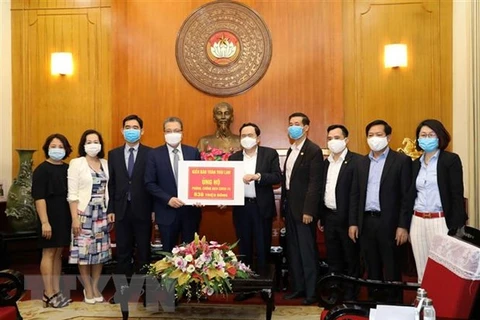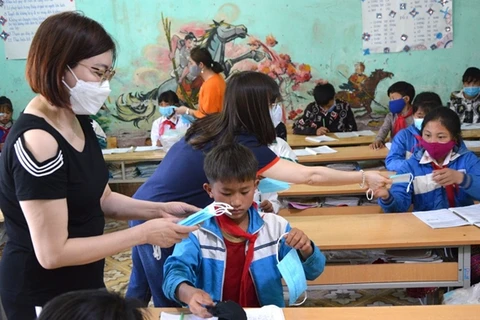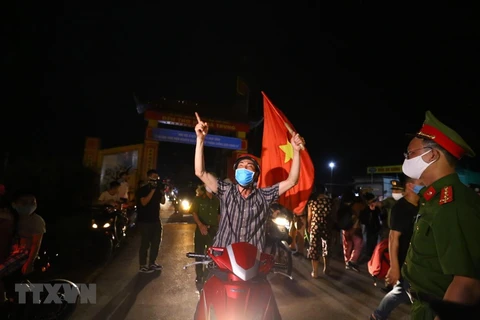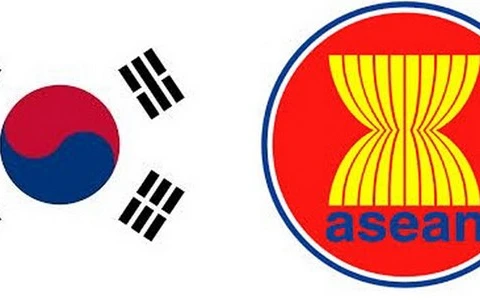Hanoi (VNA) – Korean Ambassador to Vietnam Park Noh-wan has written an article on the relationship between the Republic of Korea (RoK) and Vietnam. Following is the full text of the article.
As of May 19, 2020, the number of infected cases from COVID-19 pandemic in the world reached more than 4,740,000 causing tragic loss of lives of over 310,000 people.
Right now, COVID-19 is still spreading rapidly around the globe with the US and Europe remaining the epicentres of the outbreak. Nowhere in the world is safe from COVID-19.
Among this unprecedented global health crisis, there are a few countries where people are gradually getting back to their normal daily lives: Vietnam and the Republic of Korea. The two countries have successfully coped with the crisis thanks to their excellent epidemic prevention capacity and dedicated efforts of their people, which led to these countries be praised by the world as successful model cases in fighting COVID-19.
Despite concerns about the vulnerability of Vietnam to COVID-19 due to its relatively limited public health capacity, Vietnam has so far recorded only 324 cases and no intra-community infection for 33 days in a row. This is the result of joint efforts of the Vietnamese government and people in all socio-economic areas with the spirit of 'fighting against the pandemic like fighting against an enemy’.
Mr. Ousmane Dione, the Country Director of the World Bank (WB) in Vietnam, hailed Vietnam’s response to COVID-19 as exceptional. British newspaper The Financial Times also highlighted that the fight against COVID-19 of Vietnam won praise for its low-cost model.
One of the bases of the success stemmed from implementing effective measures against the pandemic. Prime Minister Nguyen Xuan Phuc stated that “Vietnam has basically pushed the COVID-19 pandemic away and this is the joint victory of the Party, State and People” at the recent regular Government meeting on April 28.
In fact, Vietnamese people are cautiously but gradually returning to a peaceful and stable life. Two weeks ago, on the occasion of South Vietnam Liberation Day on April 30 and International Labour Day on May 1, Hanoi streets were full of cars and motorbikes while many people enjoyed daily life with their families and friends at restaurants and cafes.
On the other hand, South Korea, which was at high-risk recording hundreds of new daily infection cases in the early stage of COVID-19 outbreak, has continued to implement pandemic prevention measures based on three principles: Open, Transparent and Civic Engagement. Accordingly, the daily number of new cases has been subdued and the government of South Korea has finally shifted focus from social distancing toward distancing in daily life starting from May 6. Public facilities such as libraries have resumed operations and students started to go back to school. Also, South Korea is the only country in the world initiating its professional football and baseball leagues at the same time. As Korean people are gradually returning to daily life, AFP, leading global news agency of France, introduced Korea as ‘the first country to overcome COVID-19’ and Antonio Guterres, Secretary-General of the United Nations, hailed ‘Korea’s measures against COVID-19 have been extremely successful’.
I am truly proud of the fact that both Vietnam and Korea have gradually stabilised their COVID-19 situation and are being considered as the most successful countries in fighting the pandemic. But at the same time, I sincerely hope that, as much as their people are going back to their daily lives, the two countries could also resume their previous excellent relationships in terms of people-to-people exchange.
Taking into consideration the fact that Vietnam has been the key partner of the New Southern Policy of South Korea and has actively interacted with South Korea in various areas of economy, tourism and culture, the two countries should begin now to actively explore ways to normalise their people-to-people exchange to be well prepared for the post COVID-19 ‘New Normal’.
I think that governments of the two countries have in fact common values and shared interests in normalising people-to-people exchange. That is the very reason why the Vietnamese government allowed entry to Vietnam of the essential personnel of large corporations such as Samsung and LG as well as SMEs of South Korea necessary to continue their business and production process without a hitch. Further to these make-shift measures, the Vietnamese government and the Korean Embassy in Hà Nội began to discuss ways to devise frameworks to normalise exchange activities between the two countries.
As people-to-people exchange started after going through a difficult process, like a proverb “A good beginning is half the task”, I hope that the airlines between the two countries will soon be reopened as previously so that more people of the two countries can freely visit each other. As more people move freely, the RoK and Vietnam will be not only the leaders in COVID-19 prevention and control but also be successful even in the post COVID-19 ‘New Normal’.
A Vietnamese proverb says that “There is sunshine after the rain”. I firmly believe that like this proverb, after this rain of “COVID-19”, relationship between the RoK and Vietnam will be brighter than ever.
Lastly, I would like to take this opportunity to appreciate the efforts of the Vietnamese government in normalising people-to-people exchange between Vietnam and the RoK. Moreover, as the Korean Ambassador to Vietnam, I also would like to promise that I will do my best to build closer relationship between the two countries./.
As of May 19, 2020, the number of infected cases from COVID-19 pandemic in the world reached more than 4,740,000 causing tragic loss of lives of over 310,000 people.
Right now, COVID-19 is still spreading rapidly around the globe with the US and Europe remaining the epicentres of the outbreak. Nowhere in the world is safe from COVID-19.
Among this unprecedented global health crisis, there are a few countries where people are gradually getting back to their normal daily lives: Vietnam and the Republic of Korea. The two countries have successfully coped with the crisis thanks to their excellent epidemic prevention capacity and dedicated efforts of their people, which led to these countries be praised by the world as successful model cases in fighting COVID-19.
Despite concerns about the vulnerability of Vietnam to COVID-19 due to its relatively limited public health capacity, Vietnam has so far recorded only 324 cases and no intra-community infection for 33 days in a row. This is the result of joint efforts of the Vietnamese government and people in all socio-economic areas with the spirit of 'fighting against the pandemic like fighting against an enemy’.
Mr. Ousmane Dione, the Country Director of the World Bank (WB) in Vietnam, hailed Vietnam’s response to COVID-19 as exceptional. British newspaper The Financial Times also highlighted that the fight against COVID-19 of Vietnam won praise for its low-cost model.
One of the bases of the success stemmed from implementing effective measures against the pandemic. Prime Minister Nguyen Xuan Phuc stated that “Vietnam has basically pushed the COVID-19 pandemic away and this is the joint victory of the Party, State and People” at the recent regular Government meeting on April 28.
In fact, Vietnamese people are cautiously but gradually returning to a peaceful and stable life. Two weeks ago, on the occasion of South Vietnam Liberation Day on April 30 and International Labour Day on May 1, Hanoi streets were full of cars and motorbikes while many people enjoyed daily life with their families and friends at restaurants and cafes.
On the other hand, South Korea, which was at high-risk recording hundreds of new daily infection cases in the early stage of COVID-19 outbreak, has continued to implement pandemic prevention measures based on three principles: Open, Transparent and Civic Engagement. Accordingly, the daily number of new cases has been subdued and the government of South Korea has finally shifted focus from social distancing toward distancing in daily life starting from May 6. Public facilities such as libraries have resumed operations and students started to go back to school. Also, South Korea is the only country in the world initiating its professional football and baseball leagues at the same time. As Korean people are gradually returning to daily life, AFP, leading global news agency of France, introduced Korea as ‘the first country to overcome COVID-19’ and Antonio Guterres, Secretary-General of the United Nations, hailed ‘Korea’s measures against COVID-19 have been extremely successful’.
I am truly proud of the fact that both Vietnam and Korea have gradually stabilised their COVID-19 situation and are being considered as the most successful countries in fighting the pandemic. But at the same time, I sincerely hope that, as much as their people are going back to their daily lives, the two countries could also resume their previous excellent relationships in terms of people-to-people exchange.
Taking into consideration the fact that Vietnam has been the key partner of the New Southern Policy of South Korea and has actively interacted with South Korea in various areas of economy, tourism and culture, the two countries should begin now to actively explore ways to normalise their people-to-people exchange to be well prepared for the post COVID-19 ‘New Normal’.
I think that governments of the two countries have in fact common values and shared interests in normalising people-to-people exchange. That is the very reason why the Vietnamese government allowed entry to Vietnam of the essential personnel of large corporations such as Samsung and LG as well as SMEs of South Korea necessary to continue their business and production process without a hitch. Further to these make-shift measures, the Vietnamese government and the Korean Embassy in Hà Nội began to discuss ways to devise frameworks to normalise exchange activities between the two countries.
As people-to-people exchange started after going through a difficult process, like a proverb “A good beginning is half the task”, I hope that the airlines between the two countries will soon be reopened as previously so that more people of the two countries can freely visit each other. As more people move freely, the RoK and Vietnam will be not only the leaders in COVID-19 prevention and control but also be successful even in the post COVID-19 ‘New Normal’.
A Vietnamese proverb says that “There is sunshine after the rain”. I firmly believe that like this proverb, after this rain of “COVID-19”, relationship between the RoK and Vietnam will be brighter than ever.
Lastly, I would like to take this opportunity to appreciate the efforts of the Vietnamese government in normalising people-to-people exchange between Vietnam and the RoK. Moreover, as the Korean Ambassador to Vietnam, I also would like to promise that I will do my best to build closer relationship between the two countries./.
VNA
























